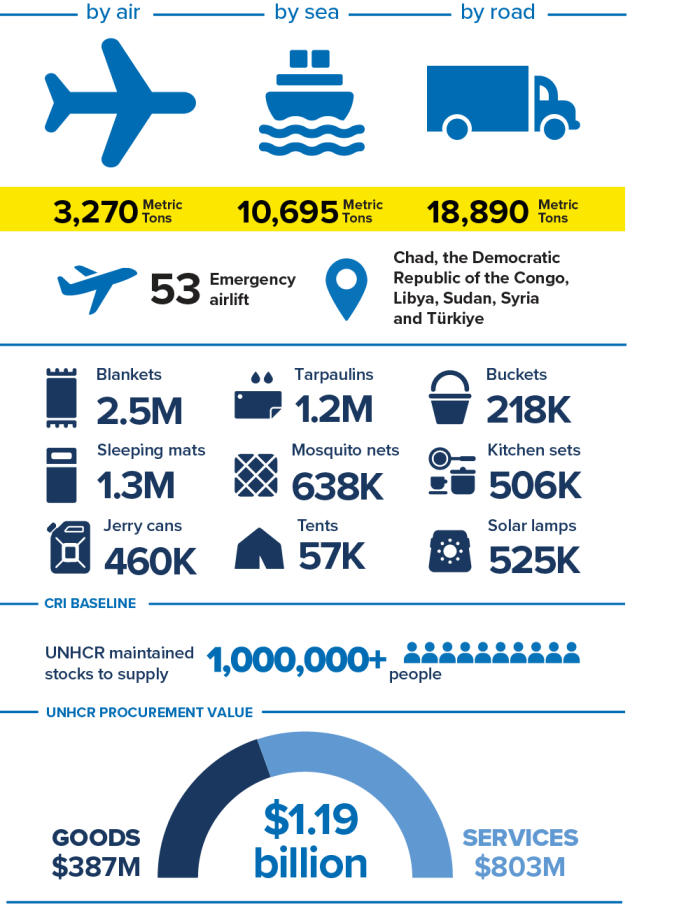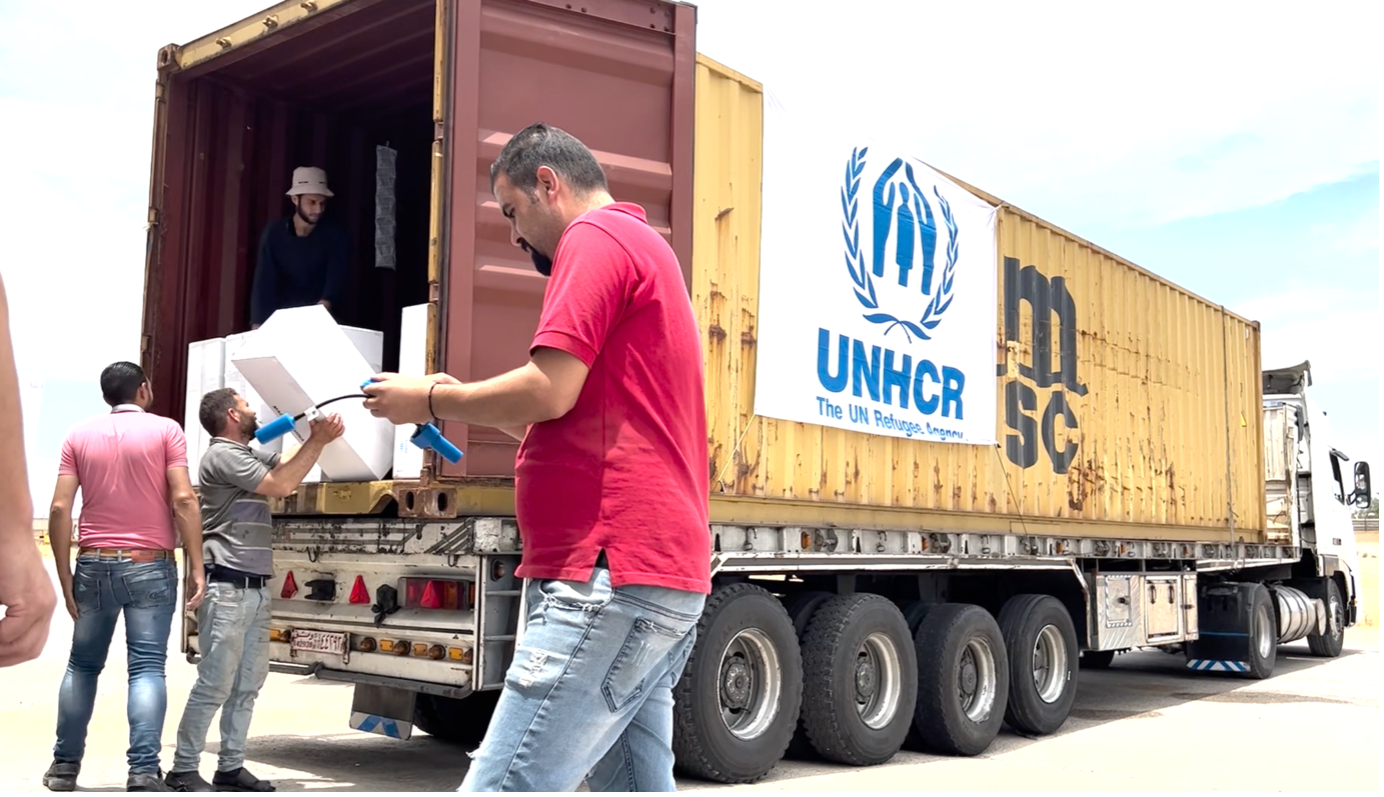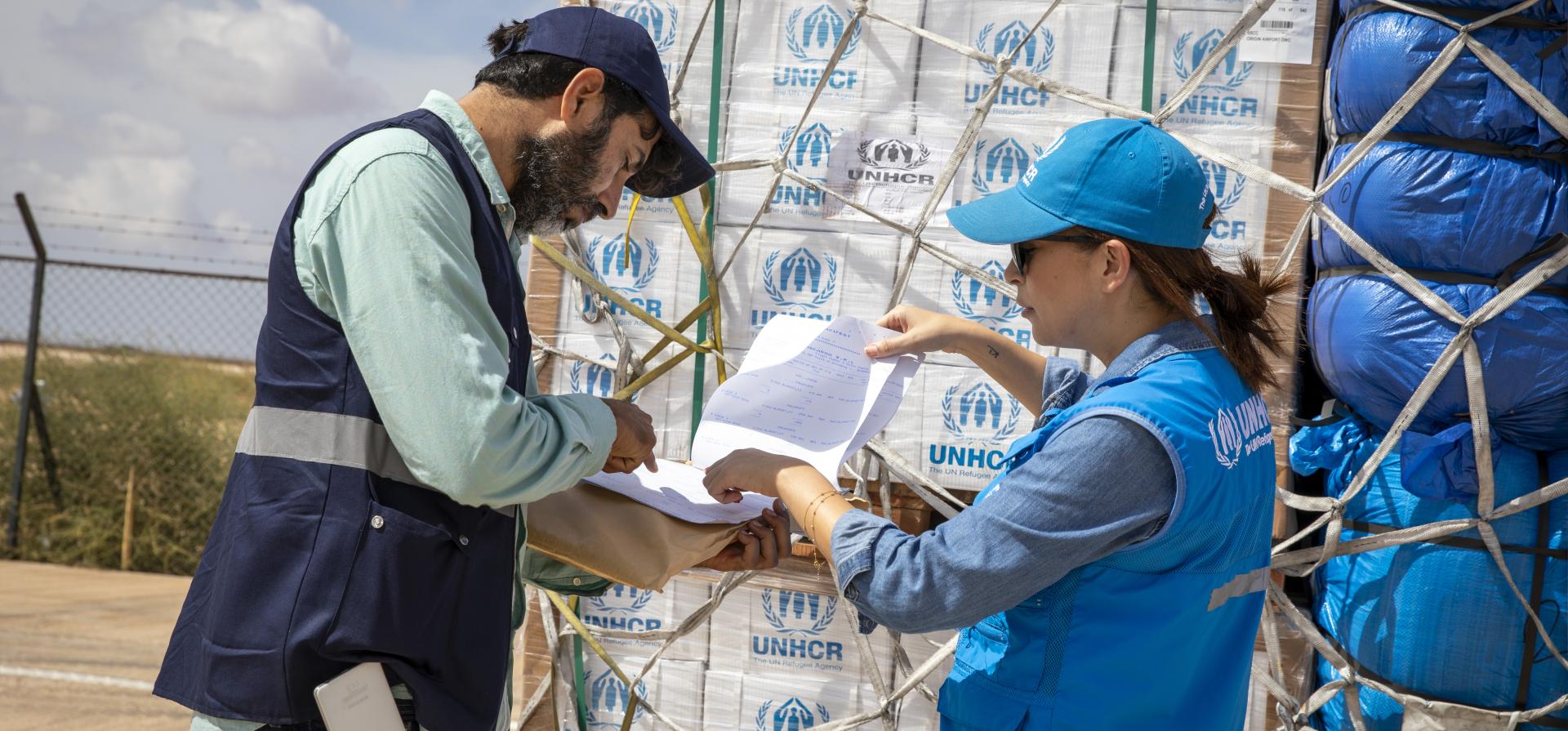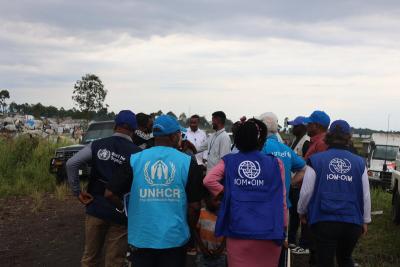Efficient, modern, and streamlined systems and processes
UNHCR successfully implemented a series of initiatives under its Business Transformation Programme (BTP). Central to this was the successful launch of Cloud ERP in 2023, a cloud-based enterprise resource planning solution, which integrated various functions such as financial management, contributions management, supply chain management, budget monitoring and reporting, and travel management. The introduction of Cloud ERP streamlined processes, eliminated redundancies, and digitized travel management, resulting in faster and more efficient execution.
In collaboration with partners like the UNDP and the United Nations International Computing Centre (UNICC), UNHCR introduced a Global Payment Gateway, integrated with Cloud ERP, enhancing global cash forecasting, liquidity visibility, and automation capabilities. Another noteworthy achievement was the launch of UNIFIER, a global facilities database consolidating comprehensive information on over 550 UNHCR offices worldwide. This database, which includes details such as rent costs, space, waste production, water and energy consumption, and physical accessibility, supports day-to-day operations and decision-making.
Moreover, the roll-out of the Project Reporting, Oversight, and Monitoring Solution (PROMS) digitized the management of over 1,800 funded partnership agreements, enabling better visibility, oversight, and result attribution. PROMS is expected to enable significant future time efficiencies in partnership management, including for partners, who can directly access the platform. Over 3,000 UNHCR and partner staff globally were trained on PROMS. Furthermore, UNHCR realigned its existing budgeting and planning tool, COMPASS, to work with the new systems introduced under the BTP. Project Link was integrated with different systems and tools, completing 101 data integrations, streamlining business processes, and reducing manual work.
The Digital Gateway Project, an important component of UNHCR’s registration efforts, marked a significant milestone in its first year. It provided self-service to 113,000 people, exceeding its initial goal of 75,000. In Egypt, the project introduced self-onboarding and appointment scheduling to expedite the emergency registration of refugees from Sudan.
Furthermore, a collaboration between UNHCR, IOM and the United States led to the creation of the Safe Mobility Initiative. This self-onboarding portal provides refugees and migrants with safer and legal migration routes to the USA. The initiative, which has been implemented in Colombia, Costa Rica, Guatemala and Ecuador, enables users to pre-register and complete a questionnaire that guides them to the appropriate support from either UNHCR or IOM.
UNHCR’s “Population Registration and Identity Management EcoSystem” (PRIMES) saw a surge in registrations, with an additional 2.55 million people, bringing the total active registered population to over 17.1 million. Furthermore, Chad and Egypt received extra support for their emergency response to the situation in Sudan. In Ukraine, efforts were made to register internally displaced persons (IDPs) to ensure their protection and the delivery of assistance. The registration system underwent a major technological revamp with the migration of proGres (Profile Global Registration System) to the cloud. This transition resulted in immediate enhancements in terms of performance, stability, and security.
UNHCR made significant strides in expanding the reach of the Refugee Data Finder, which has now garnered 700,000 page views and has been utilized by nearly 100,000 users via the mobile app. In addition, UNHCR has enriched the Microdata Library by offering 170 new datasets. In a collaborative effort with the OECD, UNHCR enhanced the reporting of financial data in the Global Compact Indicator Report. This collaboration resulted in a twofold increase in the number of data records for the GCR Indicator Report, rising from 408 in 2021 to 816 in 2023.
Through collaboration with partners and the adoption of innovative solutions, UNHCR aims to better fulfil its mission of providing support and protection to refugees and displaced persons worldwide.
Enhanced operational support, supply chain and technology
In a year fraught with escalating crises, UNHCR found itself grappling with 43 emergencies across 29 countries, including Level 3 emergencies in Egypt, Chad, Sudan, and South Sudan. This surge in emergencies, up from 35 the previous year, prompted a robust response. In response to these crises, UNHCR deployed approximately 470 colleagues, including over 200 experts from standby partners. During the year, UNHCR transported life-saving items worth $47.5 million from its global stockpiles.
UNHCR rolled out a new Policy on emergency preparedness and response, bolstered by extensive training that reached over 1,000 colleagues. Efforts to promote proactive emergency preparedness included expanding emergency partnerships, revamping the Emergency Preparedness and Response Portal and launching the new Guidance on Emergency Preparedness translated into multiple languages. To cater to the increasing deployment needs in francophone countries, UNHCR developed a specific French-speaking emergency roster.
UNHCR ramped up its emergency response mechanisms, doubling the number of emergency training sessions attended by over 380 colleagues and introducing an updated Emergency Handbook which is also open to partners. The organization's robust emergency response mechanism, lauded in the Multilateral Organization Performance Assessment Network (MOPAN) report, facilitated rapid surge and timely scale-up in crisis response.
Lessons gleaned from previous responses and evaluations, including in Ukraine and through the Sudan situation real-time review, informed UNHCR's strategic planning and the development of simplified procedures across operational areas. UNHCR is actively engaged in discussions on encouraging engagement of the local actors in an emergency response.
In supply management, the report on Improving the sustainability of UNHCR core relief items explored the sustainable alternatives to the use of virgin plastics for UNHCR’s core relief items. UNHCR procured 190,000 blankets made of 100% recycled PET for its response in Ukraine.
Efforts to reduce carbon emissions included developing environmentally friendly product specifications for six core relief items and working on four more items.
Promoting a culture of security has remained a priority for UNHCR, critical to facilitating the delivery of services in challenging and complex security environments. The organization provided support in the management of security risk, during multiple crises throughout 2023 through guidance to managers and support to victims impacted by 466 security incidents over the past year. UNHCR actively contributed to the UN Security Management System through coordination, development and implementation of policies and processes.
The organization continues to invest and deliver extensive security training for UNHCR workforce, managers and partners. 845 female colleagues participated in the Women's Security Awareness Training.
UNHCR continued sharing good practices and lessons learned through the Standby Partnership Network and participating in the Inter-Agency Standing Committee’s Emergency Directors Group, including through joint senior-level visits.
To streamline travel management, a global framework agreement was established at Headquarters, and gradually rolled out to about 40 operations using travel services provided by three booking centres located in Italy, Kenya, and Thailand. In parallel, UNHCR continued consolidating air travel data with several UN agencies into a unified database called the Travel Data Cube. This consolidation enabled the establishment of global agreements with airlines, leading to enhanced pricing and greater flexibility.



MSC Foundation’s in-kind support for Türkiye and Syria: Amplifying UNHCR’s emergency relief and distribution capacity
Following the devastating earthquakes in Türkiye and Syria in 2023, the MSC Foundation played a crucial role in facilitating the transportation of almost 440,000 essential relief items in 101 shipping containers containing essential relief items. This enabled UNHCR to swiftly reach almost 270,000 displaced individuals with vital emergency aid.
This prompt and efficient logistical support ensured that critical relief items reached those in need without delay, even in the most challenging circumstances.
Strengthened human resources and improved organizational culture
UNHCR was present in 136 countries and territories with offices in 544 locations.

*Includes UNVs, individual contractors and consultants hired through UNOPS or directly, deployees, secondees and interns.
UNHCR has consistently demonstrated its commitment to its workforce through its people-centric approach, strategic partnerships, and innovative technology. This commitment is further reflected in the organization’s efforts to cultivate a diverse and empowering culture that mirrors the communities we serve. Significant progress has been made in integrating diversity, equity, and inclusion (DEI) into UNHCR operations, with a particular emphasis on achieving gender parity at all levels. To further support employees, UNHCR introduced a new parental leave policy with inclusive definitions of parenthood and expanded leave entitlements.
UNHCR has launched an updated Strategy and Action Plan on Tackling Sexual Misconduct 2023-25, building on the work accomplished through the previous three-year strategy and responding to the organization’s current operational needs. The Office of the Principal Advisor on Protection from Sexual Exploitation and Abuse (PSEA) and Sexual Harassment (SH) provided support and guidance, engaging with a network of over 400 country-based PSEA focal points to integrate protection from sexual misconduct, particularly in emergency contexts.
UNHCR also continued to refine its HR Digital Solution, Workday, which streamlines HR processes and modernizes the employee digital HR experience. Collaboration with regional HR teams was strengthened, supported by initiatives such as the Workforce Planning Handbook. Occupational health and safety remain a cornerstone of UNHCR's employee experience strategy. The launch of the UNHCR Strategy on Workplace Mental Health and Psychosocial Well-being and the UNHCR Mental Health Forum bolster mental health awareness and support. Relatedly, good people management remains a priority, evidenced by the introduction of the new Evolve performance management model and the pilot of Regional Talent Advisors to enhance talent management efforts. Partnerships with renowned institutions further bolster UNHCR's efforts in promoting good people management and workforce engagement. In 2023, UNHCR enhanced its efforts in professional development and overall well-being of UNHCR staff through programmes such as the Connected Leadership Academy, the Women in Management Programme, UN Foundation for Peace on Purpose Workshops, and Wellbeing@UNHCR.
UNHCR continued to cultivate a robust risk management culture across all operational and management areas, striving to achieve an advanced level of risk maturity. The Risk Management Strategy was operationalized through four interconnected plans focusing on data, learning, communications, and human resources. Initiatives included enhancing learning opportunities, launching multilingual e-courses, and integrating risk management responsibilities into job descriptions. The Risk Network’s outreach engaged over 8,600 participants through training sessions and speaking events. The strategy also emphasized strengthening risk culture through communication channels such as newsletters, podcasts, and video series. Oversight bodies have positively recognized UNHCR’s efforts to strengthen its risk management culture and acknowledged the solid progress made. In fact, the Board of Auditors observed that UNHCR has achieved a high level of risk maturity and is one of the leading organizations in the UN system in this area. MOPAN's Assessment Report of UNHCR’s performance also identified risk management as an area of strength for UNHCR.
Furthermore, UNHCR continued to prioritize supporting its workforce through various initiatives aimed at fostering an inclusive organizational culture, addressing sexual misconduct, modernizing HR processes, enhancing mental health support, and promoting good risk management practices.
Enhanced partnerships, coordination, public outreach and resource mobilization
UNHCR demonstrated a robust commitment to impactful communications, news, and storytelling. This was particularly evident in various initiatives such as the Global Refugee Forum, the Global Compact on Refugees, climate action, and efforts to build solidarity for displaced and stateless people. Despite facing challenges such as reduced global interest in displacement issues, UNHCR maintained its position as a leading humanitarian voice, securing mentions in over 404,000 media pieces and 4.8 million public social posts. Key milestones, including World Refugee Day and the Global Trends Report, generated significant coverage. This demonstrated UNHCR's ability to drive the narrative on global forced displacement and centre refugee voices.
The organization emphasized ethical and dignified communications, rolling out its first-ever Ethical Communications Guidelines. This ensured integrity and dignity in communication with, for, and about displaced and stateless people.
In 2023, UNHCR bolstered participation and co-creation with displaced and stateless people, with approximately 80% of all global communications products being people-centred. Noteworthy initiatives included partnerships with platforms like YouTube. Refugee women led on UNHCR's social media accounts during International Women's Day, and refugee voices were featured in various communications efforts.
Partnerships with Goodwill Ambassadors and high-profile individuals significantly contributed to UNHCR's communication efforts. It is worth noting that 50% of UNHCR’s global Goodwill Ambassadors are refugees or former refugees. Collaborations with entities like Al Jazeera, Reuters Connect, YouTube, Google, FC Barcelona, FIFA, and the Academy Awards helped reach new audiences and mobilize support.
UNHCR also focused on integrity and oversight in partnership reform efforts, actively engaging in inter-agency efforts to improve collaboration through tools like the UN Partner Portal. By the end of 2023, 11 UN agencies were using the Partner Portal. UNHCR finalized the Programme Handbook for Partners, providing guidance on relevant procedures, and introducing enhanced processes for assessing partners' internal controls, including measures to prevent and respond to sexual exploitation and abuse (SEA). UNHCR also introduced an enhanced process for assessing internal controls of partners, rolling out a template harmonized with the micro-assessment template used by other UN agencies applying the Harmonized Approach to Cash Transfers (HACT). These changes are expected to double the number of partners for which UNHCR will have assessed internal controls and allow for information sharing across UN agencies when working with shared partners.
UNHCR made significant progress in partnership reform in 2023, with increased engagement, improved partnership management frameworks, and enhanced integrity measures, all aimed at better serving displaced and stateless people.


Championing sport for protection - Premier sporting organizations stand with refugees
Some of the world's premier sporting and athletics organizations showed support for forcibly displaced people in 2023. Fundación Fútbol Club Barcelona collaborated with España con ACNUR to help finance projects in Colombia, Malaysia, Türkiye and Uganda. Barca players Ilkay Gundogan, Aitana Bonmati and Lucy Bronze brought soccer star power to UNHCR events hosted by Goodwill Ambassador Danny Ocean.
Adidas, a partner of UNO-Flüchtlingshilfe, pledged during the Global Refugee Forum to fund sport projects supporting refugees and host communities, supporting UNHCR’s Sports 4 Protection programme in Bangladesh, enabling vulnerable groups to participate in sports.
Australia for UNHCR (A4U) worked with FIFA to promote the 2023 Women’s World Cup. A4U also partnered with refugee athletes such as Olympian and former refugee Bendere Oboya to promote its refugee and sports campaign. During its annual World Refugee Day lunch, A4U raised funds for sporting facilities in camps. A series of films helped to promote the campaign, including one with Australian rules football player and A4U Ambassador Akec Makur Chuot. Nottingham Forest FC's partnership with UK for UNHCR garnered support for emergency appeals and national media attention, with social media reaching 283 million impressions and 16 million engagements in the first two months alone. These contributions underscore the profound reach of sports in advancing both the protection and well-being of forcibly displaced individuals globally.
Effective strategic leadership and governance and independent oversight
The Executive Committee (ExCom) and UN Member States were steadfast in their support of UNHCR in 2023. At the annual Pledging Conference in December 2022, Member States pledged record contributions of $1.53 billion for UNHCR programmes and activities in 2023. The second Global Refugee Forum was held in December in Geneva, mobilizing whole-of-society support and engagement towards the objectives of the Global Compact on Refugees. It brought together more than 4,000 participants from 168 States and over 425 other stakeholders and partners from around the world, including more than 320 forcibly displaced and stateless persons. An additional 10,000 participants joined the proceedings virtually from 120 countries – a further demonstration of the Forum’s relevance, breadth, and diversity. The Forum saw substantive engagement with some 1,750 pledges of financial, technical, material, and policy support submitted.
Evaluations of UNHCR’s action continued to highlight achievements and lessons learned. Evaluations of UNHCR’s policy implementation, such as the Evaluation of UNHCR’s Engagement in Situations of Internal Displacement, highlighted UNHCR’s strong comparative advantage on protection and operational effectiveness. It also flagged the need for UNHCR to play a more predictable leadership and coordination role. Emergency responses in Afghanistan, Ethiopia and the Ukraine refugee crisis were the focus of three evaluations. Their recommendations contributed towards the revision of the UNHCR’s Policy and Handbook on Emergency Preparedness and Response. Cash-based interventions, livelihoods, economic inclusion, and UNHCR’s work on shelter and settlements, particularly in West and Central Africa, were key themes of several decentralized evaluations. Results have shown that UNHCR continues to work towards sustainable solutions, working alongside national social protection systems and initiatives for local economic development. The nexus evaluation, in its final year follow-up report, highlighted the importance of UNHCR addressing system-level bottlenecks to economic inclusion. Finally, several joint and inter-agency evaluations with partner UN agencies have been undertaken to strengthen our partnerships and the delivery of common results. Further, the Evaluation Office developed a new 2024-2027 Evaluation Strategy, focusing on a change across three dimensions: coverage of strategic directions with quality evaluative evidence, capacity to evaluate and use evidence, and culture of evidence and learning.
As the demand on UNHCR and its independent oversight system increased, the Inspector General's Office (IGO) was a crucial player in ensuring the effectiveness and efficiency of UNHCR's oversight and integrity systems. The IGO advanced its strategy by defining the scope of investigations, enhancing investigation delivery, promoting learning and risk prevention, and examining independent oversight data.
In response to the rising volume of misconduct complaints, the IGO implemented several initiatives such as streamlining intake processes, restructuring investigations intake capacity, and utilizing improved software tools for data gathering and analysis. As a result, the IGO was able to process and respond to a high volume of complaints and conduct investigations into allegations of misconduct. The IGO also supported changes such as engagement in the Support Desk for workplace concerns and managing the Speak Up Helpline to ensure confidentiality and anonymity.
The IGO managed internal online dashboards for planning and tracking recommendations, issued strategic reports and analysis, and provided comprehensive training sessions for UNHCR operations and partners. This was done to advance awareness and accountability on assurance and integrity issues. To ensure a robust independent oversight system, the IGO coordinated among the internal and external oversight providers, which contributed to meaningful choreography of oversight exercises. The IGO also increased engagement with donors to offer assurance of UNHCR's independent integrity and oversight systems. Through the efforts of the IGO and other oversight mechanisms and evaluations, UNHCR continued to improve its operations and strengthen accountability to better serve displaced and stateless people.

